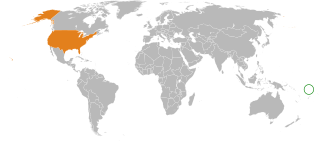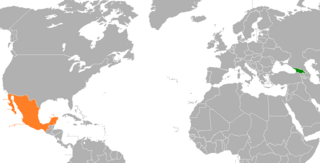Related Research Articles

Kiribati, officially the Republic of Kiribati, is an island country in the Micronesia subregion of Oceania in the central Pacific Ocean. Its permanent population is over 119,000 as of the 2020 census, with more than half living on Tarawa atoll. The state comprises 32 atolls and one remote raised coral island, Banaba. Its total land area is 811 km2 (313 sq mi) dispersed over 3,441,810 km2 (1,328,890 sq mi) of ocean.

Kiribati is a full member of the Commonwealth, the IMF and the World Bank, and became a full member of the United Nations in 1999. Kiribati hosted the Thirty-First Pacific Islands Forum in October 2000. Kiribati has Least Developed Country Status and its interests rarely extend beyond the region. Through accession to the Lomé Convention, then Cotonou Agreement, Kiribati is also a member of the African Caribbean and Pacific Group. Kiribati maintains good relations with most countries and has particularly close ties to Pacific neighbours Japan, Australia, South Korea and New Zealand. Kiribati briefly suspended its relations with France in 1995 over that country's decision to renew nuclear testing in the South Pacific.

The Pacific Islands Forum (PIF) is an inter-governmental organization that aims to enhance cooperation among countries and territories of Oceania, including formation of a trade bloc and regional peacekeeping operations. It was founded in 1971 as the South Pacific Forum (SPF), and changed its name in 1999 to "Pacific Islands Forum", so as to be more inclusive of the Forum's Oceania-spanning membership of both north and south Pacific island countries, including Australia. It is a United Nations General Assembly observer.

Tarawa is an atoll and the capital of the Republic of Kiribati, in the Micronesia region of the central Pacific Ocean. It comprises North Tarawa, which has 6,629 inhabitants and much in common with other more remote islands of the Gilbert group, and South Tarawa, which has 56,388 inhabitants as of 2015, half of the country's total population. The atoll was the site of the Battle of Tarawa during World War II.

South Tarawa is the capital and hub of the Republic of Kiribati and home to more than half of Kiribati's population. The South Tarawa population centre consists of all the small islets from Betio in the west to Bonriki and Tanaea in the north-east, connected by the South Tarawa main road, with a population of 63,439 as of 2020.
Ambo may refer to:
After the 2007 United Nations Climate Change Conference held on the island of Bali in Indonesia in December 2007, the participating nations adopted the Bali Road Map as a two-year process working towards finalizing a binding agreement at the 2009 United Nations Climate Change Conference in Copenhagen, Denmark. The conference encompassed meetings of several bodies, including the 13th session of the Conference of the Parties to the United Nations Framework Convention on Climate Change and the third session of the Conference of the Parties serving as the meeting of the Parties to the Kyoto Protocol.

Tuvalu – United States relations are bilateral relations between Tuvalu and the United States.

The Climate Vulnerable Forum (CVF) is a global partnership of countries that are disproportionately affected by the consequences of climate change. The forum addresses the negative effects of climate change as a result of heightened socioeconomic and environmental vulnerabilities. These countries actively seek a firm and urgent resolution to the current intensification of climate change, domestically and internationally. The CVF was formed to increase the accountability of industrialized nations for the consequences of global climate change. It also aims to exert additional pressure for action to tackle the challenge, which includes the local action by countries considered susceptible. Political leaders involved in this partnership are "using their status as those most vulnerable to climate change to punch far above their weight at the negotiating table". The governments which founded the CVF agree to national commitments to pursue low-carbon development and carbon neutrality.

The 2010 United Nations Climate Change Conference was held in Cancún, Mexico, from 29 November to 10 December 2010. The conference is officially referred to as the 16th session of the Conference of the Parties (COP 16) to the United Nations Framework Convention on Climate Change (UNFCCC) and the 6th session of the Conference of the Parties serving as the meeting of the Parties (CMP 6) to the Kyoto Protocol. In addition, the two permanent subsidiary bodies of the UNFCCC — the Subsidiary Body for Scientific and Technological Advice (SBSTA) and the Subsidiary Body for Implementation (SBI) — held their 33rd sessions. The 2009 United Nations Climate Change Conference extended the mandates of the two temporary subsidiary bodies, the Ad Hoc Working Group on Further Commitments for Annex I Parties under the Kyoto Protocol (AWG-KP) and the Ad Hoc Working Group on Long-term Cooperative Action under the Convention (AWG-LCA), and they met as well.
The Tarawa Climate Change Conference (TCCC), was held in the Republic of Kiribati from 9 to 10 November 2010. The purpose of the conference was to support the initiative of the President of Kiribati, Anote Tong, to hold a consultative forum between vulnerable states and their partners with a view of creating an enabling environment for multi-party negotiations under the auspices of the UNFCCC. The conference was the successor event to the Climate Vulnerable Forum held in November 2009 in the Maldives, when eleven climate vulnerable countries signed the Bandos Island declaration pledging to show moral leadership and commence greening their economies by voluntarily committing to achieving carbon neutrality. Based on the lessons learned in the COP process, the TCCC proposed a more inclusive format of consultations, involving key partners among major developed and developing nations.
The Climate Vulnerability Monitor (CVM) is an independent global assessment of the effect of climate change on the world's populations brought together by panels of key international authorities. The Monitor was launched in December 2010 in London and Cancun to coincide with the UN Cancun Summit on climate change (COP-16). Developed by DARA and the Climate Vulnerable Forum, the report is meant to serve as a new tool to assess global vulnerability to various effects of climate change within different nations.

The International Day of Forests was established on the 21st day of March, by resolution of the United Nations General Assembly on November 28, 2013. Each year, various events celebrate and raise awareness of the importance of all types of forests, and trees outside forests, for the benefit of current and future generations. Countries are encouraged to undertake efforts to organize local, national, and international activities involving forests and trees, such as tree planting campaigns, on International Day of Forests. The Secretariat of the United Nations Forum on Forests, in collaboration with the Food and Agriculture Organization, facilitates the implementation of such events in collaboration with governments, the Collaborative Partnership on Forests, and international, regional and subregional organizations. International Day of Forests was observed for the first time on March 21, 2013.
The Kiribati Adaptation Program (KAP) is a US$5.5 million initiative that was originally enacted by the national government of Kiribati with the support of the Global Environment Facility (GEF), the World Bank, the United Nations Development Program, and the Japanese Government. Australia later joined the coalition, donating US$1.5 million to the effort. The program aims to take place over 6 years, supporting measures that reduce Kiribati's vulnerability to the effects of climate change and sea level rise by raising awareness of climate change, assessing and protecting available water resources, and managing inundation. At the start of the Adaptation Program, representatives from each of the inhabited atolls identified key climatic changes that had taken place over the past 20–40 years, and proposed coping mechanisms to deal with these changes under 4 categories of urgency of need. The program is now focusing on the country's most vulnerable sectors in the most highly populated areas. Initiatives include improving water supply management in and around Tarawa; coastal management protection measures such as mangrove re-plantation and protection of public infrastructure; strengthening laws to reduce coastal erosion; and population settlement planning to reduce personal risks.
This is a list of notable events relating to the environment in 2010. They relate to environmental law, conservation, environmentalism and environmental issues.

The United Nations Climate Change Conferences are yearly conferences held in the framework of the United Nations Framework Convention on Climate Change (UNFCCC). They serve as the formal meeting of the UNFCCC parties – the Conference of the Parties (COP) – to assess progress in dealing with climate change, and beginning in the mid-1990s, to negotiate the Kyoto Protocol to establish legally binding obligations for developed countries to reduce their greenhouse gas emissions. Starting in 2005 the conferences have also served as the "Conference of the Parties Serving as the Meeting of Parties to the Kyoto Protocol" (CMP); also parties to the convention that are not parties to the protocol can participate in protocol-related meetings as observers. From 2011 to 2015 the meetings were used to negotiate the Paris Agreement as part of the Durban platform, which created a general path towards climate action. Any final text of a COP must be agreed by consensus.
The Majuro Declaration is an initiative of the Pacific Islands Forum, which was signed on 5 September 2013 at Majuro in the Marshall Islands during the 44th Pacific Islands Forum summit. At the summit the leaders of the Pacific Islands Forum nations recognised the need for strengthened national systems to plan for, access, deliver, absorb and monitor climate change and for donor countries to continue to simplify and harmonise their assessment, implementation and reporting processes for financing projects directed to climate change adaptation, mitigation and risk reduction.

Georgia–Mexico relations are the international relations between Georgia and Mexico. Both nations are members of the United Nations.

The effects of climate change on small island countries are impacting people who live in coastal areas through sea level rise, increasing heavy rain events, tropical cyclones and storm surges. The effects of climate change threaten the existence of many island countries, island peoples and their cultures, and will alter their ecosystems and natural environments. Despite their heterogeneity, small island developing states (SIDS) are recognized as being particularly at risk to climate change. They share numerous common traits and have been quite vocal in calling attention to the challenges they face from climate change.

Kiribati-Taiwan relations refers to relations between Kiribati and Taiwan. Kiribati, under the government of President Taneti Mamau, initially recognised the ROC but switched to PRC later on.
References
- Ford, Liz; Aaron Packard (16 November 2010). "Kiribati climate change conference calls for urgent cash and action". The Guardian. London. Retrieved 10 December 2010.
- Morningstar, Cory; Joan Russow (25 November 2010). "The AMBO Declaration: Where the Vulnerable are Disposable". Huntington, West Virginia: Huntington News Network. Archived from the original on 7 December 2010. Retrieved 10 December 2010.